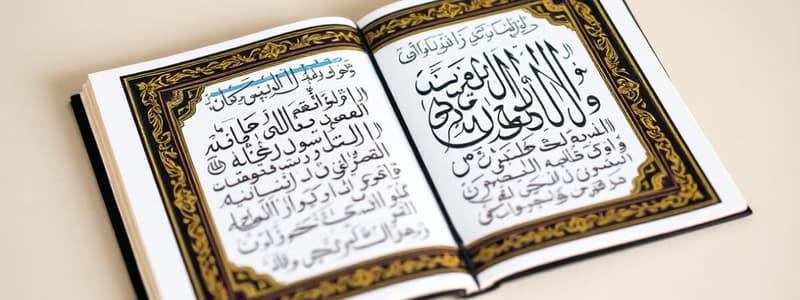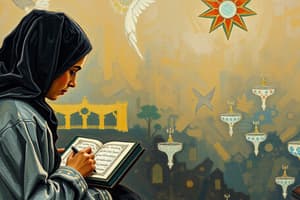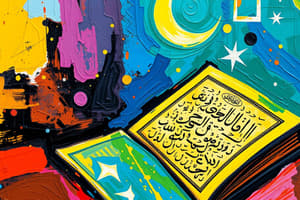Podcast
Questions and Answers
Considering the socio-political climate described, what nuanced interplay between religious authority and Pashtun tribal customs is most likely influencing the mufti's stance on girls' education?
Considering the socio-political climate described, what nuanced interplay between religious authority and Pashtun tribal customs is most likely influencing the mufti's stance on girls' education?
- The mufti strategically employs a combination of selective religious interpretations and leverages the deeply ingrained Pashtunwali code of honor (ghairat) to assert control over community norms and reinforce patriarchal structures. (correct)
- The mufti's objections stem primarily from concerns about the economic impact of girls' education on traditional Pashtun livelihoods, with religious justifications serving as a secondary rationale.
- The mufti's position is solely derived from strict interpretations of Islamic scripture, overriding any local customs and traditions due to his perceived religious authority.
- Pashtun tribal customs, particularly those related to female seclusion (purdah), are entirely independent of Islamic influence, and the mufti's views reflect purely secular tribal norms.
Given the father's compromise regarding separate gates, analyze its potential long-term ramifications within the specific context of Pashtun societal dynamics.
Given the father's compromise regarding separate gates, analyze its potential long-term ramifications within the specific context of Pashtun societal dynamics.
- The compromise will have no significant long-term impact on Pashtun societal dynamics, as the community's views on girls' education are already firmly established and resistant to change.
- The compromise, while seemingly conciliatory, may inadvertently validate the mufti's initial objections and solidify existing gender segregation norms, potentially emboldening more radical elements within the community. (correct)
- The father's willingness to compromise will be perceived as a sign of weakness, leading to an escalation of demands from the mufti and increased pressure to fully close the school.
- The compromise will likely resolve the immediate conflict and foster a lasting sense of mutual respect and understanding between the father and the community.
Considering the narrator's statement about Pashtun men and unresolved arguments, how might this cultural trait influence the future trajectory of the conflict between the father and the mufti?
Considering the narrator's statement about Pashtun men and unresolved arguments, how might this cultural trait influence the future trajectory of the conflict between the father and the mufti?
- The father, aware of this cultural trait, will proactively seek to build a stronger relationship with the mufti to diffuse any potential future conflict.
- The cultural trait is irrelevant in this situation, as the conflict is primarily driven by religious differences rather than personal pride or stubbornness.
- The mufti, driven by Pashtun pride and a reluctance to concede defeat, is likely to seek future opportunities to undermine the school and potentially incite further conflict using more clandestine means. (correct)
- The mufti will likely accept the father's compromise and harbor no further resentment, as Pashtun men are known for their ability to forgive and forget.
Given the narrator's positive experiences at the madrasa, what critical distinction can be inferred about differing interpretations and applications of Islamic teachings within the community?
Given the narrator's positive experiences at the madrasa, what critical distinction can be inferred about differing interpretations and applications of Islamic teachings within the community?
How does the surreptitious attendance of the mufti's niece at the father's school introduce a layer of cognitive dissonance and potential vulnerability within the mufti's stance?
How does the surreptitious attendance of the mufti's niece at the father's school introduce a layer of cognitive dissonance and potential vulnerability within the mufti's stance?
Considering the mention of the illegal radio broadcast influencing the mufti, what role do alternative media and information channels play in shaping public opinion and exacerbating social tensions within this specific cultural context?
Considering the mention of the illegal radio broadcast influencing the mufti, what role do alternative media and information channels play in shaping public opinion and exacerbating social tensions within this specific cultural context?
How might the father's status as a school owner and educator challenge the established power dynamics and traditional roles within the Pashtun community, thereby contributing to the conflict with the mufti?
How might the father's status as a school owner and educator challenge the established power dynamics and traditional roles within the Pashtun community, thereby contributing to the conflict with the mufti?
Given the historical and geopolitical context of the region, to what extent might external influences (e.g., foreign ideologies, political agendas, or funding) be indirectly shaping or exacerbating the conflict between the father and the mufti?
Given the historical and geopolitical context of the region, to what extent might external influences (e.g., foreign ideologies, political agendas, or funding) be indirectly shaping or exacerbating the conflict between the father and the mufti?
Assess the potential for the conflict described to escalate beyond a localized dispute and contribute to broader societal polarization and radicalization within the region.
Assess the potential for the conflict described to escalate beyond a localized dispute and contribute to broader societal polarization and radicalization within the region.
In light of the Quran's presence in the father's home, what specific theological or hermeneutical arguments might the mufti employ to reconcile his opposition to girls' education with the explicit presence of religious texts?
In light of the Quran's presence in the father's home, what specific theological or hermeneutical arguments might the mufti employ to reconcile his opposition to girls' education with the explicit presence of religious texts?
Flashcards
Mufti
Mufti
An Islamic scholar or authority on religious matters.
Blasphemy
Blasphemy
An act of disrespect or irreverence toward something considered sacred.
Purdah
Purdah
A practice among some Muslims of secluding women from men, often involving veiling.
Maulana
Maulana
Signup and view all the flashcards
Quran
Quran
Signup and view all the flashcards
Madrasa
Madrasa
Signup and view all the flashcards
Pashtun culture
Pashtun culture
Signup and view all the flashcards
Khushal School
Khushal School
Signup and view all the flashcards
Community elders
Community elders
Signup and view all the flashcards
Educational compromise
Educational compromise
Signup and view all the flashcards
Study Notes
The First Direct Threat
- The narrator's father argued with a mufti (Islamic scholar) who claimed the girls' high school was blasphemous.
- The mufti argued girls shouldn't attend school and should be in purdah.
- The mufti was influenced by a maulana who delivered sermons against "un-Islamic" people.
- The mufti's niece attended the school secretly.
Religious Education
- The narrator studied the Quran from a young age.
- The narrator attended a religious school (madrasa) after school.
- The madrasa was an open-air mosque where boys and girls learned the Quran together.
- The narrator's teacher in madrasa was a kind, wise woman.
Studying That Suits You
Use AI to generate personalized quizzes and flashcards to suit your learning preferences.




